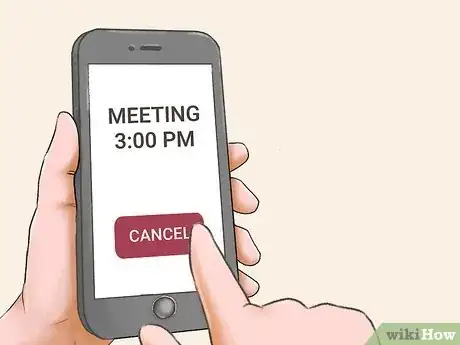This article was co-authored by Salina Shelton, LPC, MA. Salina Shelton is a Licensed Professional Counselor, specializing in Art Therapy in San Antonio, Texas. She received her MA in Counseling from The University of Texas at San Antonio in 2013 and her Certificate in Expressive Arts Therapy from Prescott College in 2015
There are 20 references cited in this article, which can be found at the bottom of the page.
This article has been viewed 22,251 times.
There are many ways to spend more time with your adult children. To get started, organize your time in such a way that allows you to spend more time with them. This might mean, for instance, that you put off things you can do some other day and instead spend time with your adult children. Identify activities that you and your adult children can do together like going for walks, attending the opera, or riding your bikes.
Steps
Making Time
-
1Reorganize your schedule. One way to find more time for your adult children is to delegate or reschedule tasks that you don’t absolutely need to do. For instance, let dusting the house wait until tomorrow so that you can head out to the theatre with your adult children. Or ask your coworker to swap assignments with you so that you can sneak out of the house to grab dinner with your adult children.[1]
-
2Schedule time to spend with your adult children. One of the main reasons that families don’t spend time together is that they simply don’t make a point of getting together.[2] Include spending time with your adult children on your planner or calendar, just as you would with any other appointment or meeting.[3]
- Just call your adult child up and ask, “How would you like to get lunch on Sunday?” If they are not free Sunday, propose the following weekend or ask, “What is a day that works for you?”
- Remember, everyone is busy, but you only have one life. You might regret not spending more time with your adult children if you don’t take time to do so.
Advertisement -
3Don’t make excuses. There are many reasons you might appeal to in order to justify not spending time with your adult children. Some of these reasons might even be premised on your own consideration of their time and well-being. For instance, you might think, “My kid’s busy with their own family/life, so they don’t have time to see me.” However, if you continually allow your thinking and habits to be swayed by excuses, you will end up never spending time with your adult children.[4]
-
4Create new rituals. In addition to random lunches or get-togethers with your adult children, set up some regular occasions when you can get together with them and their families. For instance, perhaps you and your adult children gather every Sunday, or during every first Sunday of the month to play board games or go for a bike ride.[7]
Identifying Activities You Could Do Together
-
1Discuss with your adult children what you would like to do. Take some time getting to know what your adult children are interested in doing. You could ask, for instance, “What would you like to do?” Listen attentively. Then, based on their feedback and suggestions, develop a game plan that ensures fun for you, your adult children, your partner, and other relevant parties (for instance, the partner of your adult children, your grandchildren, and so on).
- If discussing what your adult children would like to do in person, use positive body language like maintaining eye contact and nodding to show you are listening.
-
2Get together for holidays or other special occasions. Many people find that holidays are a great time to spend with their adult children and other family members. Identify the major holidays in your nation and offer your adult children the chance to celebrate one or more of them with you. For instance, if you live in Canada, you might choose to call your adult children prior to Christmas and invite them to share a pleasant home-cooked meal together.[11]
-
3Ask your adult children to accompany you on errands. Even the most mundane activities or outings can be an opportunity to spend more time with your adult children. For instance, if you’re headed to the store (and especially if the store is near your adult child’s residence), you might ask your adult child, “I’m heading to the grocer’s. Would you like to accompany me?”[12]
- In a variation of this, you could ask your adult children to help you around the house. For instance, if you are moving out of your house, you could ask your adult children to come over and box up your possessions.
- This might provide you and your adult children an opportunity to bond over the house they grew up in, or to rediscover some artifact of their past (an old photo or beloved toy) that could make you and your adult child remember how special your family is.
-
4Cook dinner together. Host a large dinner party with your adult children. Cooking with your adult children can be great fun, and it can be a great way to pass along family recipes and stories. For the ultimate adventure, choose a dish that neither you nor your children have ever made before. That way, you’re all learning together.[13]
- Make a big batch so you all have some leftovers you can take home for the next few nights.
-
5Walk your pets together. If both you and your adult children have dogs, you could introduce them to each other for playdates and walks. This way, your dogs could meet new friends and you could spend more time with your adult children.[14]
- When you first introduce your dogs to each other, keep them on their leashes. Let them see and sniff each other from a distance for a few minutes at first.
- Some degree of roughhousing is expected, but if they start growling at each other, baring their teeth, and lowering their heads, you should separate them and try introducing them to each other another day.
-
6Watch TV or movies together. If you and your adult children have a show you’re both interested in, or if you and your adult children are both interested in seeing a certain movie, you can use your shared interest to spend time together. Have a movie or show night. After the show or movie, you can talk about your favorite scene or discuss your different interpretations of the story or characters.[15]
-
7Attend a public lecture. If you and your adult children live near a museum or university, you can probably catch a lecture on an important and interesting subject for free. Check the events calendar of your local university or public institution for free lectures on a variety of subjects, and choose one that you and your adult children are both interested in.[16]
-
8Volunteer at charitable institutions. If you have a soup kitchen or food bank nearby, they probably have unmet volunteer needs. You and your adult children might, for instance, be tasked with boxing food or picking up goods that will later be redistributed to those in need. Ask your adult children if they’d be interested in giving back to their community with you. If they are, contact the organization you’re interested in volunteering for and schedule time to volunteer.[17]
- Volunteering for a charitable organization is not only a great way to spend more time with your adult children, but it is a good way to help those in need, too.
-
9Go on vacations together. Invite your adult children to head to the beach or mountains with you. You and your adult children can enjoy time away from the hectic pace of work to catch up with each other.[18]
- If your adult children have significant others, be sure to invite them, too.
- Float a few vacation destination options by your adult children. Talk to them about what sort of vacation they’d like, then decide together where you’d like to go as a family.
-
10Exercise with your adult children. You and your adult children could go on walks or bike rides at your local park. This will not only keep both of you hale and hearty, but it will also provide a great opportunity to catch up with one another about what’s going on in your lives and what sorts of [19]
Having a Good Relationship
-
1Be respectful of your adult child’s boundaries. This means respecting the privacy and decisions of your adult child. For instance, even if your child was always present for holidays when they were growing up, they might be less inclined to come home for the holidays as adults, especially if they have their own families to attend to, or if they live far away now.[20]
- Additionally, do not drop by unannounced if your child does not invite you over to their residence. Not only do you risk wasting your time if they are not home, but you also risk souring their mood if they feel put-upon and inconvenienced by your coming over.
- When visiting your child’s residence, do not treat their house as an extension of your house. Obey their rules. For instance, if you do not take your shoes off when entering your house but your child does ask guests to take their shoes off in their house, conform to your child’s rules and take your shoes off when visiting. Being respectful of your child’s home can help to make them feel accepted by you, which may foster a healthy, happy relationship between you.
- If your child still lives with you as an adult, permit them some extra space. For instance, knock before you enter their room.
-
2Support your child emotionally. Let your adult child know that you will be there for them when they need you. Listen to what they’re going through and offer empathy and understanding. For instance, if your adult child is having a hard time with a relationship, say, “Wow, that sounds like a difficult situation” or “I hope you can work it out.”[21]
- Providing emotional support primarily requires listening, not problem-solving. Offer advice or material aid only when asked to do so.
-
3Don’t continuously push unsolicited advice. For instance, if your child does not pursue a PhD even though you really want them to, do not continually bring it up or needle them to obtain a PhD. You might hear comments like, “You should really get a PhD” or “You might be able to get a better job with a PhD” as helpful suggestions, but your adult child might see them as pestering or nagging. If your adult child says they are not interested in acting on your unsolicited advice, accept their decision.[22]
- Keep in mind that giving unsolicited advice can have the effect of making your child feel like you are disappointed in them, which may sour your relationship.
-
4Ask your adult children what their preferred mode of communication is. If you contact your children via their preferred mode of communication, they are more likely to respond and reply to you. This might require changing your preferred mode of communication, but if you can make it easier for them to respond to you, you might be able to spend more time with them.[23]
- If your children prefer to text, but you don’t know how to text, then ask your children how to use the voice to text feature on your phone.
References
- ↑ http://www.parents.com/parenting/better-parenting/advice/maximize-family-time/
- ↑ http://articles.chicagotribune.com/2011-07-19/features/sc-fam-0719-parental-connection-20110720_1_parents-and-kids-parents-relish-relationship
- ↑ http://www.parents.com/parenting/better-parenting/advice/maximize-family-time/
- ↑ http://www.lifehack.org/articles/featured/11-practical-ways-to-stop-procrastination.html
- ↑ http://www.cbsnews.com/news/good-grandparent-grandchild-bond-may-lower-depression-risk-for-both/
- ↑ http://www.alzheimers.net/8-1-14-babysitting-grandkids-alzheimers/
- ↑ http://articles.chicagotribune.com/2011-07-19/features/sc-fam-0719-parental-connection-20110720_1_parents-and-kids-parents-relish-relationship
- ↑ https://www.scientificamerican.com/article/why-rituals-work/
- ↑ https://hbr.org/2013/12/new-research-rituals-make-us-value-things-more
- ↑ https://www.argosy.edu/our-community/blog/The-Psychology-and-Science-of-Traditions-Rituals
- ↑ http://blogs.usda.gov/2016/12/19/a-holiday-get-together-cooking-for-friends-and-family/
- ↑ http://www.parents.com/parenting/better-parenting/advice/maximize-family-time/
- ↑ http://verilymag.com/2015/05/how-to-spend-quality-time-with-friends-and-also-get-stuff-done
- ↑ http://www.canadianliving.com/life-and-relationships/relationships/article/5-ways-to-make-more-time-for-your-friends
- ↑ http://www.lifehack.org/406517/4-ways-to-spend-quality-time-with-your-friends
- ↑ http://verilymag.com/2015/05/how-to-spend-quality-time-with-friends-and-also-get-stuff-done
- ↑ http://verilymag.com/2015/05/how-to-spend-quality-time-with-friends-and-also-get-stuff-done
- ↑ http://www.lifehack.org/406517/4-ways-to-spend-quality-time-with-your-friends
- ↑ http://www.lifehack.org/406517/4-ways-to-spend-quality-time-with-your-friends
- ↑ http://www.aarp.org/home-family/friends-family/info-04-2013/parenting-adult-children-family-relationships.html
- ↑ http://www.aarp.org/home-family/friends-family/info-04-2013/parenting-adult-children-family-relationships.html
- ↑ http://www.aarp.org/home-family/friends-family/info-04-2013/parenting-adult-children-family-relationships.html
- ↑ http://bottomlineinc.com/mistakes-parents-make-that-push-adult-children-away/













































































